- Offensive Techniques & Strategies
Loose Balls, Deflections & Saves
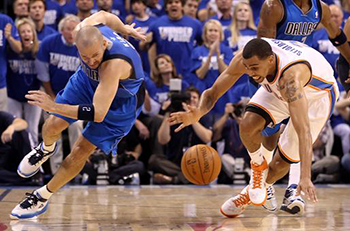
Pass deflections, loose ball recoveries and saving the ball from going out of bounds are Really Big Plays. Really Big Plays are extra effort actions that ignite and inspire teammates, and, as a result, change the momentum and outcome of the game. They are the result of just plain determination and hustle. The great thing about RBP's is that they do not require any special abilities or talent on the part of the players. Anyone can make them.

| Deflections | Saves | Loose Balls |
What to Discover or Recall:
On pass deflections, cut off the defender and then go for the ball.
Coaches love players that go to the floor for loose balls.
When saving a ball from going out of bounds save to a teammate, throw off opponent or call timeout.

Pass Deflection Recoveries

In attacking the passing lane, rather than stepping forward with the back foot into the passing lane to intercept the pass, deflect the ball with the lead hand (Stop Sign). Stepping into the passing lane with the back foot takes time and, most of the time, results in a near miss creating an open driving lane to the basket.
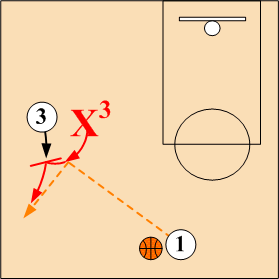
To obtain possession when a pass is deflected, the defender must first cut off the receiver and then go for the ball. By stepping in front and cutting off the receiver, it will insure ball possession.
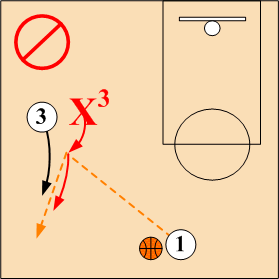
When the defender goes directly for the ball without first cutting off the receiver, then ball possession will be up for grabs.

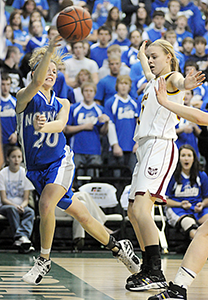
Saving Ball From Going Out of Bounds
Saving the ball from going out of bounds is a Really Big Play (RBP). Although it may require a super individual effort on the part of the player, to insure success, it requires a total team effort.
1. Save to a Teammate
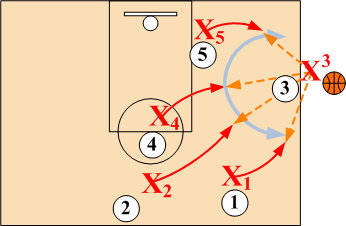
In saving the ball, all teammates must be alert and break to the ball to receive the save pass. This provides for multiple save options. In this situation, the worst thing that can happen is for a teammate to stand and watch.
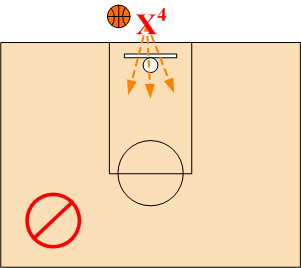
CAUTION
At the defensive end of the court, never save the ball by throwing it directly under the defensive basket. In this case, an interception will result in an easy shot and score for the opponents.
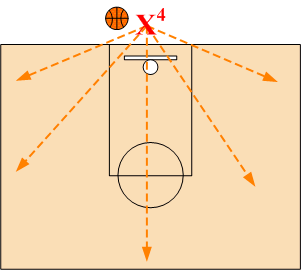
Save it by throwing the ball out to mid court or to a sideline. In these cases, if the opponent should intercept the save, the defense will have time to recover and prevent an easy basket.
2. Throw Ball Off an Opponent
In cases where the ball cannot be saved directly to a teammate, throw the ball off an opponent's leg out of bounds. Throwing the ball off an opponent is an intelligent play. However, since the opponent is very vulnerable, it should never be done with the force that could harm or injure the opponent.
3. Call Time Out
Calling a time out while in the air should be a last resort. Since saving the ball from going out of bounds is not covered by most programs, players having watched on TV games, tend to call time out as the first option rather than the last. However, time outs are precious and surely needed especially at the end of a close game. In addition, when the ball is saved directly to a teammate, it usually catches the opponents off guard resulting in an easy basket or fast break.

Loose Ball Recovery
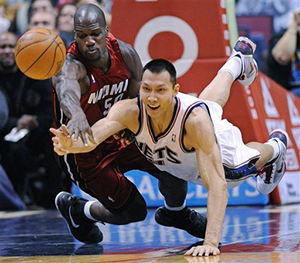
Coaches love to see players go to the floor for loose balls. However, like taking an offensive charge, players must be taught how properly dive for loose balls without sacrificing their bodies or risk of injury.
Loose ball dives are tricky. For this reason players should have a working knowledge of the correct techniques and plenty of practice repetitions before diving for a loose ball during a game.
In diving for loose balls, players should first lower their center of gravity close to the floor by having their knees bent (defensive stance).
Then push forward extending arms and legs straight out parallel to the floor and landing on their hip flexors. Diving for the ball should be graceful and the body should land softly like a gymnast.
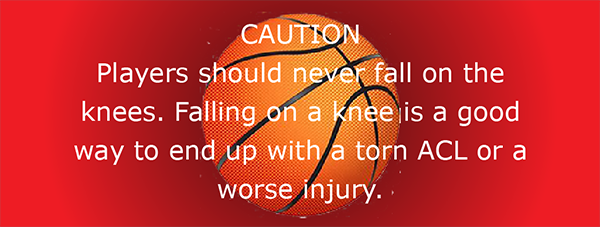
Once players learn how to properly dive for loose balls, the more apt they are to go after loose balls during a game without hesitation.
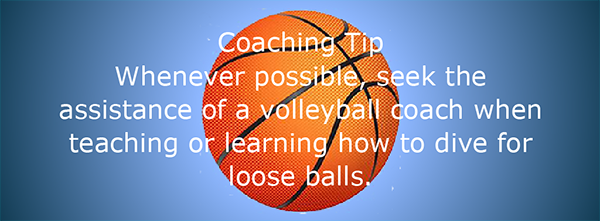
© 2026 HoopTactics All Rights Reserved.
